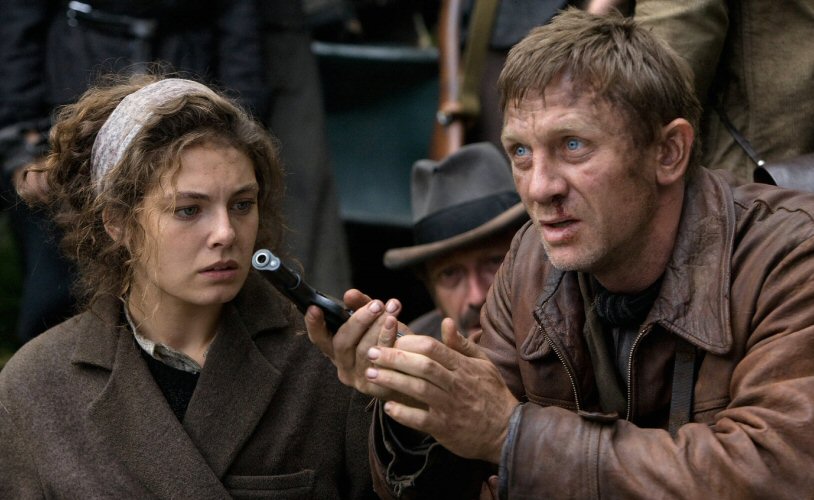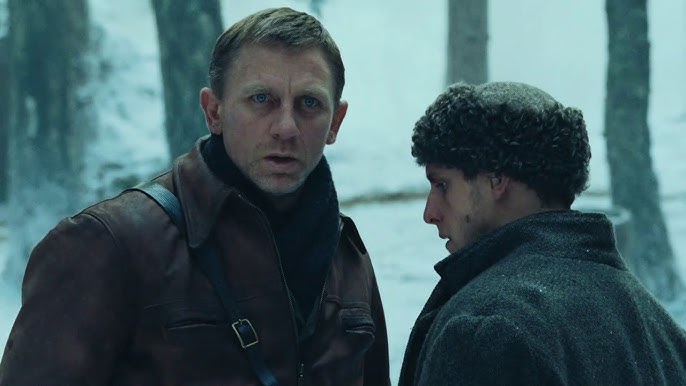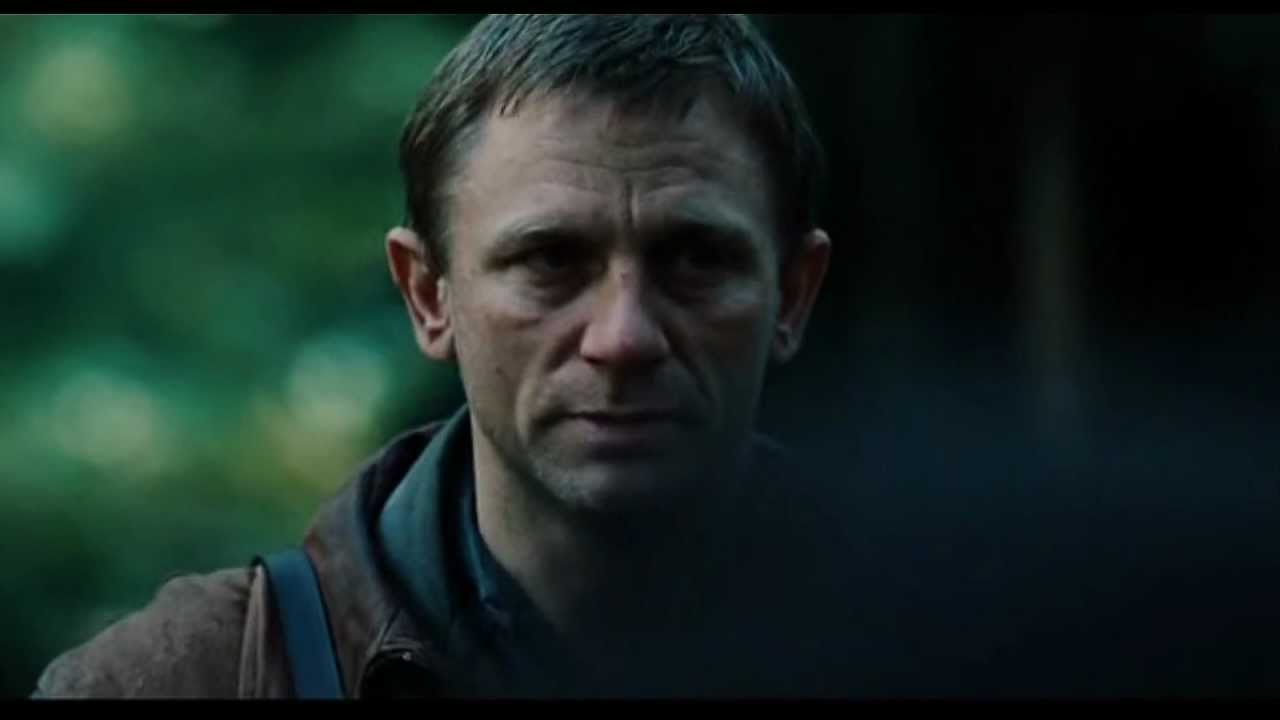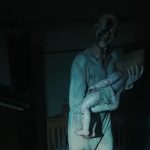🎬 Defiance (2008)

Defiance (2008) Movie Review: A Powerful Story of Resistance, Courage, and Survival
Introduction: A Gripping Tale of Jewish Resistance During WWII
Defiance (2008), directed by Edward Zwick, is a compelling historical war drama based on the true story of the Bielski partisans, a group of Jewish fighters who fought against the Nazis in Eastern Europe during World War II. Set against the harrowing backdrop of the Holocaust, the film tells the story of three Jewish brothers who, after the brutal massacre of their family, lead a group of Jewish refugees to resist the Nazis in the forests of Belarus. The film showcases the power of courage, community, and resilience in the face of unspeakable atrocities, offering a gripping portrayal of the human spirit’s capacity for defiance.
Starring Daniel Craig, Liev Schreiber, and Jamie Bell, Defiance features powerful performances and emotionally charged sequences that explore the moral and personal complexities of survival and resistance. The film balances action and drama with a deep focus on the emotional and psychological toll that war and conflict have on individuals, making it a moving and thought-provoking war film.
Plot Summary: The Fight for Survival in the Forests of Belarus
The story of Defiance is centered around the Bielski brothers—Tuvia (Daniel Craig), Zus (Liev Schreiber), and Asael (Jamie Bell)—who, after their family is killed by Nazi forces in 1941, flee into the forests of Belarus. The brothers, who are skilled fighters, are determined to avenge the deaths of their loved ones and protect the Jewish community from further persecution.
As the Nazis tighten their grip on the region, the Bielski brothers form a resistance group made up of Jewish refugees who have escaped the brutality of the Nazi occupation. They take refuge in the dense forests, where they establish a hidden camp and begin to fight back against the Germans. Over the course of the film, Tuvia and his brothers not only face the constant threat of discovery and death but also struggle with the internal conflicts that arise from their differing approaches to leadership and survival.
Tuvia, the eldest brother, becomes the leader of the group and is committed to protecting the refugees at all costs. However, his leadership is challenged by Zus, who becomes increasingly disillusioned with the passive approach Tuvia takes toward their survival. Zus believes that the only way to survive is through active resistance and military action, which leads to a rift between the brothers. Asael, the youngest, finds himself caught in the middle of this ideological conflict, torn between his loyalty to his brothers and his desire to survive at any cost.
As the group grows and becomes more established in the forest, they face not only the threat of Nazi soldiers but also the challenges of life in the wilderness. The refugees must contend with hunger, disease, and the harsh elements as they fight for their survival. The constant tension between the brothers, along with the moral dilemmas they face, adds a layer of complexity to the film, as it explores the costs of resistance and the sacrifices necessary for survival.
The Performances: Strong Cast Brings Depth to the Characters
The performances in Defiance are outstanding, with each actor bringing depth and humanity to their respective roles. Daniel Craig, known for his portrayal of James Bond in the James Bond franchise, delivers a powerful performance as Tuvia Bielski, the stoic and determined leader of the resistance group. Craig captures the inner turmoil of a man who must balance his desire for vengeance with his responsibility to protect the lives of others. Tuvia’s moral compass is tested throughout the film, and Craig’s performance brings out the complexity of this character’s journey.
Liev Schreiber plays Zus, the more impulsive and aggressive of the Bielski brothers. Schreiber’s portrayal of Zus is intense and emotionally charged, as his character struggles with the decision to abandon his family and join the Soviet partisans in order to fight more actively against the Nazis. The tension between Tuvia and Zus is one of the film’s central conflicts, and Schreiber brings a sense of urgency and passion to his role, creating a compelling contrast to Craig’s more restrained performance.
Jamie Bell, known for his role in Billy Elliot (2000), portrays Asael, the youngest of the Bielski brothers. Bell’s performance is quietly poignant as Asael grapples with his own fears and moral dilemmas. Asael’s evolution from a frightened boy to a capable fighter is handled with subtlety and care, and Bell brings an emotional depth to the character that adds layers to the film’s exploration of the human cost of war.
The supporting cast, which includes actors such as Alexa Davalos, Mark Feuerstein, and Jodhi May, also delivers strong performances. Alexa Davalos plays the role of a Jewish refugee, Chaya, who forms a romantic relationship with Asael, adding an emotional and personal layer to the story. The film’s ensemble cast works together seamlessly, creating a sense of camaraderie and unity among the resistance fighters.
Cinematography and Visuals: A Stunning Depiction of the Eastern Front
The cinematography in Defiance is striking and effective, with the forests of Belarus providing a dramatic and foreboding backdrop to the story. The dense, dark woods are both a sanctuary and a prison for the Bielski brothers and their group, and the cinematography captures this sense of isolation and tension. The camera often focuses on the intimate details of the characters’ experiences—whether it’s the cold, the hunger, or the fear that they face on a daily basis—helping to immerse the audience in the harsh realities of war.
The battle sequences are dynamic and well-choreographed, with the tension of the Nazi attacks providing a constant sense of danger. The action scenes are visceral and intense, but the film never loses sight of the emotional stakes. The cinematography also highlights the vast scale of the conflict, contrasting the personal struggles of the characters with the broader historical context of WWII.
The film’s use of natural light and the muted color palette also adds to the grim, realistic atmosphere. The bleakness of the environment is mirrored in the emotional tone of the story, as the characters navigate a world filled with death, betrayal, and loss.
Historical Accuracy: A True Story of Resistance Against the Nazis
Defiance is based on the true story of the Bielski brothers, who led a group of Jewish partisans in the forests of Belarus during WWII. The Bielski partisans are one of the most well-known examples of Jewish resistance during the Holocaust, and the film stays relatively true to their story, though some liberties are taken for dramatic purposes.
The real Bielski brothers helped save the lives of over 1,200 Jewish refugees during the war, and their efforts are depicted in the film with a high degree of historical accuracy. The film highlights the bravery and resilience of the Jewish fighters, but it also acknowledges the challenges and moral complexities they faced. The internal conflicts among the Bielski brothers, particularly the tensions between Tuvia and Zus, are based on real events, though some aspects of their relationship are dramatized for cinematic effect.
While the film takes some creative liberties with certain aspects of the story, it remains faithful to the overall spirit of the Bielski brothers’ resistance efforts. The film does an excellent job of capturing the horrors of the Holocaust and the courage of those who fought back against the Nazis, offering a powerful tribute to the unsung heroes of WWII.
Themes: Resistance, Sacrifice, and the Moral Cost of War
At its core, Defiance is a film about resistance and survival in the face of overwhelming odds. The Bielski brothers, along with the refugees they protect, refuse to submit to the Nazi regime, choosing instead to fight back with whatever means they have at their disposal. The film emphasizes the power of defiance and the human capacity for resilience in the face of brutality.
The theme of sacrifice is also central to the film, as the characters are forced to make difficult choices for the sake of their survival and the survival of others. The emotional and psychological toll of these sacrifices is evident throughout the film, as the characters grapple with the consequences of their actions. The film explores how war can change people, challenging their moral beliefs and forcing them to confront difficult decisions.
Another significant theme is the moral complexity of war. Tuvia’s leadership style is grounded in a desire to protect the lives of the refugees, but this sometimes clashes with Zus’ more aggressive approach. Their differing philosophies on how to fight back against the Nazis add layers of tension and complexity to the film, highlighting the difficult choices that individuals must make in times of war.
Conclusion: A Powerful and Moving Story of Jewish Resistance
Defiance (2008) is a gripping and emotionally resonant war film that tells the remarkable true story of the Bielski brothers and their resistance against the Nazis in the forests of Belarus. With strong performances from its lead cast, stunning cinematography, and a powerful exploration of themes such as resistance, sacrifice, and survival, the film offers a moving tribute to the courage and resilience of those who fought back against the horrors of the Holocaust.
While the film takes some dramatic liberties, it remains a faithful representation of the Bielski brothers’ efforts to save Jewish refugees and resist Nazi occupation. Defiance is a must-see for fans of historical war dramas and those interested in the untold stories of WWII, offering a sobering yet inspiring reminder of the strength of the human spirit in the face of unimaginable adversity.











